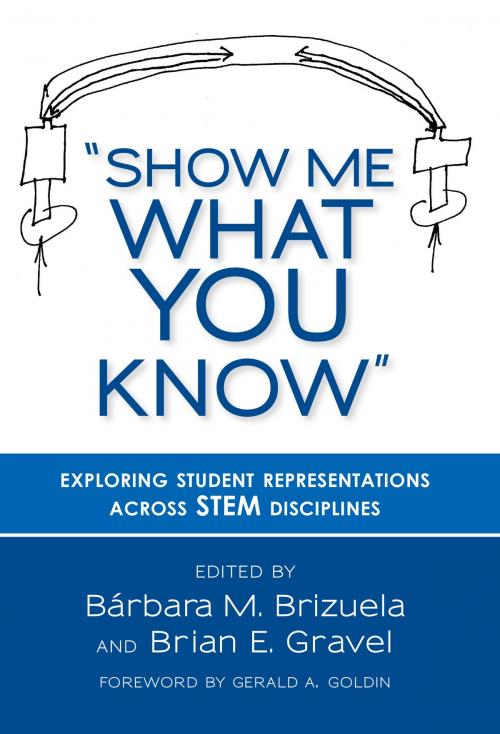Show Me What You Know
Exploring Student Representations Across STEM Disciplines
Nonfiction, Reference & Language, Education & Teaching, Teaching, Teaching Methods| Author: | Barbara M. Brizuela, Brian E. Gravel | ISBN: | 9780807771617 |
| Publisher: | Teachers College Press | Publication: | December 15, 2009 |
| Imprint: | Language: | English |
| Author: | Barbara M. Brizuela, Brian E. Gravel |
| ISBN: | 9780807771617 |
| Publisher: | Teachers College Press |
| Publication: | December 15, 2009 |
| Imprint: | |
| Language: | English |
Just like representations in everyday life, this book shows that representations are ubiquitous to science, technology, engineering, and mathematics—the STEM disciplines.“Show Me What You Know” showcases research on representations across a range of STEM disciplines and ages—from children as young as 2 years of age to professional mathematicians. The text highlights the importance of paying close attention to learners’ interpretations and productions of different representations as a source of evidence for what learners understand, and another way for learners to “show us what they know.” The text is organized around four themes: appropriation of representations, making meaning, highlighting, and representations as scaffold and supports.
Book Features:
- Focus on representations in specific STEM disciplines.
- An examination of how students across different ages engage with, produce, and use representations.
- Section reflections that serve to broaden our thinking about representations.
- Graphs, charts, and examples of students’ drawings.
Contributors include David W. Carraher, Tina Grotzer, David Hammer, Richard Lehrer, Eduardo Martí, Ricardo Nemirovsky, Tracy Noble, Juan Ignacio Pozo, Leona Schauble, Analúcia D. Schliemann, Judah L. Schwartz, and Beth Warren.
Bárbara M. Brizuela is an associate professor in the Department of Education at Tufts University. She is the author of Mathematical Development in Young Children: Exploring Notations. Brian E. Gravel is a lecturer and director of Elementary Education at Tufts University.
“We are provided not only with valuable source material for future theoretical development, but with profound encouragement for teachers and researchers to pay close attention to representations as they are generated and interpreted by students.”
—From the Foreword by Gerald A. Goldin
Just like representations in everyday life, this book shows that representations are ubiquitous to science, technology, engineering, and mathematics—the STEM disciplines.“Show Me What You Know” showcases research on representations across a range of STEM disciplines and ages—from children as young as 2 years of age to professional mathematicians. The text highlights the importance of paying close attention to learners’ interpretations and productions of different representations as a source of evidence for what learners understand, and another way for learners to “show us what they know.” The text is organized around four themes: appropriation of representations, making meaning, highlighting, and representations as scaffold and supports.
Book Features:
- Focus on representations in specific STEM disciplines.
- An examination of how students across different ages engage with, produce, and use representations.
- Section reflections that serve to broaden our thinking about representations.
- Graphs, charts, and examples of students’ drawings.
Contributors include David W. Carraher, Tina Grotzer, David Hammer, Richard Lehrer, Eduardo Martí, Ricardo Nemirovsky, Tracy Noble, Juan Ignacio Pozo, Leona Schauble, Analúcia D. Schliemann, Judah L. Schwartz, and Beth Warren.
Bárbara M. Brizuela is an associate professor in the Department of Education at Tufts University. She is the author of Mathematical Development in Young Children: Exploring Notations. Brian E. Gravel is a lecturer and director of Elementary Education at Tufts University.
“We are provided not only with valuable source material for future theoretical development, but with profound encouragement for teachers and researchers to pay close attention to representations as they are generated and interpreted by students.”
—From the Foreword by Gerald A. Goldin















